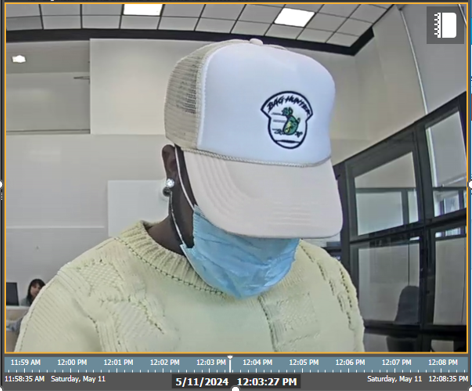Key Takeaways
- “Opting for electronic filing and selecting direct deposit is the fastest and safest way to receive a refund."
- "Make sure banking routing and account numbers are correct."
- "Why would you want to gut the safety net for taxpayers?"
- Tax bill advocates face off with parliamentarian.
- Corporate Transparency Act fadeout.
- Is that farmland or fertilizer? Deducting the cost of farm ground.
- Branded fraud apparel.
- International Waffle Day.
Follow key filing guidelines to speed refunds, avoid errors - IRS:
Collect all tax-related paperwork. Taxpayers should gather all documents including W-2s, 1099s and other information returns, as well as any supporting paperwork for tax deductions or credits such as educational credits or mortgage interest payments. Having the previous year's tax return accessible is also advised as it may be required. Taxpayers can also check their IRS Individual Online Account to view their Form W-2, Wage and Tax Statement, and Form 1095-A, Health Insurance Marketplace Statement, under the Records and Status tab in the taxpayer’s Individual Online Account.
...
Use electronic filing.
The IRS advises taxpayers and their tax advisors to use electronic filing methods such as IRS Free File, Free File Fillable Forms or with Direct File. Electronic filing decreases mathematical errors, identifies potential tax credits or deductions for which the taxpayer qualifies and prompts taxpayers for missing information. Opting for electronic filing and selecting direct deposit is the fastest and safest way to receive a refund... Make sure banking routing and account numbers are correct.
I would add: if you are using a paid preparer, you should have your information to them last week. If you don't have your information together now, plan to extend. It's much easier to extend and get your return right than it is to file a mistaken return in a hurry and then deal with error notices from an understaffed and demoralized IRS.
DOGE-ing the IRS
DOGE Hasn't Shown Need for Access to Taxpayer Info, Court Says - Mary Katherine Browne, Tax Notes ($):
“No matter how important or urgent the President’s DOGE agenda may be, federal agencies must execute it in accordance with the law. That likely did not happen in this case,” Boardman said.
...
Boardman said that under the Privacy Act, the disclosure of personal information is only warranted if needed in the performance of official duties and on a need-to-know basis. She stated that the government failed to explain why DOGE needed access to perform its duties.
Gutting the TAS Safety Net in the Interest of ‘Efficiency’ - Nina Olson, Procedurally Taxing via Tax Notes. "But all these numbers can be distracting from the underlying point — why would you want to gut the safety net for taxpayers? Do you really want to go back to pandemic-level service in the function that Congress has established to help taxpayers with significant hardship solve their problems with the IRS? How will that improve the efficiency and effectiveness of tax administration? We know the answer: It will not."
Nina Olson is a retired head of the Taxpayer Advocate Service.
Treasury Inspector General reviews IRS Direct File
IRS Underreported Direct File Costs, Watchdog Finds - Tyrah Burris, Tax Notes ($).
The IRS didn’t report $7.3 million spent by the Office of Management and Budget for the services of employees sent from the U.S. Digital Service to help the IRS develop and pilot the program, which ran from February 1 to April 20, 2024. The IRS report also didn’t include the $1.5 million cost for new users to create or leverage existing accounts through the IRS’s credential service provider, according to the TIGTA report, dated March 20.
Tax Bill Sprint (?)
The three-week sprint - Bernie Becker, Politico:
That’s one of the questions facing congressional Republicans starting this week, after both the House and the Senate return to Washington and look to make real progress on a fiscal package that includes tax cuts, border security funding and other of President Donald Trump’s priorities.
Senate GOP, Dems prepare to face off before parliamentarian over tax cut cost - Jennifer Scholtes, Politico:
Whether the parliamentarian allows GOP leaders to use the “current policy baseline” approach President Donald Trump has endorsed is crucial to their effort to enact a sweeping package that delivers on Trump’s campaign promises of tax cuts and new energy policy, plus hundreds of billions of dollars in new spending on border security and the military.
Using the "current policy baseline" is an attempt to score a continuation of expiring tax cuts as having no revenue effect.
Corporate Transparency Act Fadeout
FinCEN Exempts US Businesses From Disclosure Rules - Natlie Olivo, Law360 Tax Authority ($):
...
Under the interim final rules, FinCEN limited existing beneficial ownership reporting regulations to include only foreign reporting companies. These companies do not have to report information about any U.S. individuals who are beneficial owners of the business, according to the rules.
Related: Treasury Exempts Domestically-owned Entities from Ownership Reporting
"Liberation Day" is Next Week
Trump Might Exempt Some Nations From Reciprocal Tariffs - Collin Eaton, Gavin Bade, and Alex Leary, Wall Street Journal:
“I’m embarrassed to charge them what they’ve charged us,” Trump said.
Trump’s remarks were the latest recalibration of a slate of tariffs Trump has said he would lay out on April 2, a date he has called “liberation day.” He said Monday that other tariffs on goods such as automobiles, lumber, pharmaceuticals and semiconductors might not be implemented until later.
Is that Farmland or Fertilizer?
Considering the Residual Fertility Deduction - Kristine Tidgren, Ag Docket (my emphasis):
Recently, I have been hearing of very high values assigned to residual fertility, yielding very large I.R.C. § 180 deductions. It appears these taxpayers are going beyond the principles discussed above to take a deduction based upon the value of all nutrients in the soil. The nutrients they are valuing have no necessary link to fertilizer that was applied by the prior owner. I find no legal support for this practice. First, as discussed above, I.R.C. § 180 is only available for the purchase of fertilizer, not for the purchase of “soil nutrients.” Additionally, the limited guidance available instructs that those wishing to amortize the cost of residual fertilizer must demonstrate a link between any residual fertilizer supply and past fertilizer applications.
Beyond that, courts have specifically stated that farmers may not take a depreciation or depletion deduction for the exhaustion of soil nutrients generally.
Blogs and Bits
Advantages of ABLE savings accounts - Kay Bell, Don't Mess With Taxes. "States can offer ABLE accounts to help people who become disabled before age 26, or if their families pay for disability-related expenses detailed in IRS Publication 907, Tax Highlights for Persons with Disabilities."
IRS Updates ERC FAQ to Address Taxpayers Who Have Income Tax Issues With ERC Refunds Received - Ed Zollars, Current Federal Tax Developments. "The IRS, in the "Claiming the ERC" section of the March 20, 2025 update to their ERC website, explicitly states that the amount of the Employee Retention Credit (ERC) reduces the amount that taxpayers are allowed to report as wage expense on their income tax return for the tax year in which the qualified wages were paid or incurred. This fundamental principle is reiterated in Question 1 of the "Income tax and ERC" section, which was added on March 20, 2025, stating, "Yes. The amount of your ERC reduces the amount of your wage expense on your income tax return for the tax year in which you paid or incurred the qualified wages"."
A Win-Win Proposal to Fix Social Security - Tyler Watts, Econlib. "Here’s my idea for a Social Security buyout: I renounce the benefits that I’m entitled to when I reach retirement age. In return, the government will give me a modest, gradual reduction of my portion of the payroll tax. I crunched the numbers for a 10-year phased-in reduction of the employee’s share of the Old Age tax, from 5.3% to zero. Both Social Security and I come out ahead, easily."
The Importance of Branding, Fraud Division
We have noted that paper checks are vulnerable to theft. We have noted that the Employee Retention Credit has fraud problems. But branded clothing for check theft and ERC fraud is something new. From an IRS press release (defendant names omitted, emphasis added):
The defendants then deposited fraudulently obtained or counterfeit checks into the accounts. Many of the checks were issued by the U.S. Treasury (the “Treasury”) based on false and fraudulent filings with the Internal Revenue Service (“IRS”) in connection with the Employee Retention Credit (“ERC”) and Qualified Sick Leave Wages (“QSLW”) credit. The ERC is a refundable tax credit for businesses and tax-exempt organizations that had employees during and were affected by the COVID-19 pandemic. Employers must have paid qualified wages to claim the credit. The QSLW credit is a related credit that was also established in response to the COVID-19 pandemic. The defendants did not operate businesses that would have qualified for these credits. The businesses they used to open bank accounts and apply for the credits were fake or sham businesses.
Fraud on that scale takes teamwork. Teamwork requires branding:

A better image of the logo:

It's possible that these folks were just a bit cocky.
What day is it?
It's International Waffle Day, a most glorious event.
We're Here to Help



